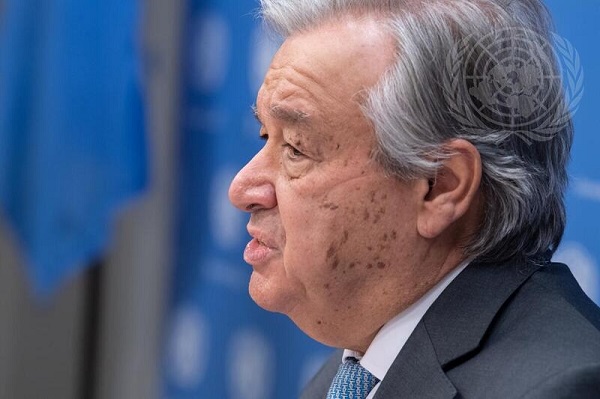
United Nations, (Samajweekly) UN Secretary-General Antonio Guterres has again offered his “good offices” to India and Pakistan to resolve their problems, even though New Delhi has rejected his involvement in bilateral disputes.
“Our good offices are always available, and we will insist within it of finding peaceful solutions for problems that have no military solution,” he said on Thursday when he was asked by a Pakistani journalist about Kashmir.
In an apparent reference to their nuclear arms, he warned: “It is clear, when seeing Pakistan and India, any military confrontation between the two would be a disaster of unmitigated proportions for both countries and for the whole world.”
Guterres said that “unfortunately” the call he had made in 2019 for resolving the disputes between the South Asian neighbours is “the same that I can say today”.
“Now, things have not moved in the right direction. I do believe that it is absolutely essential to have a de-escalation of the situation, namely in the Line of Contact (meaning Control). I think it’s absolutely essential for the two countries to be able to come together and seriously discuss their problems,” the UN chief noted.
He added that it was essential for human rights to be “fully respected” in Kashmir.
New Delhi has maintained that under the Simla Agreement of 1972 between then Indian Prime Minister Indira Gandhi and then President Zulfikar Ali Bhutto of Pakistan, all disputes between the neighbours are bilateral matters that have to be resolved by themselves without external involvement.
Islamabad has tried to internationalise the bilateral disputes by calling for mediation or other involvement by others.
India has consistently rebuffed offers by outside parties including former US President Donald Trump to mediate.
While welcoming the decision by Presidents Joe Biden of the US and Vladimir Putin of Russia to extend the Strategic Arms Reduction Treaty (START) on nuclear weapons and delivery systems, Guterres said that “all the countries that have nuclear weapons today” have to be involved in non-proliferation if progress is to be made.
Regarding social media, Guterres said that he was worried about the power that a few technology companies wield.
“I do not think that we can live in a world where too much power is given to a reduced number of companies,” he said.
“I’m particularly worried with the power that they already have. I mean, the volume of information that is being gathered about each one of us, the lack of control we have about our own, the data related to ourselves, the fact that that data can be used not only for commercial purposes to sell to advertising companies, but also to change our behaviour,” Guterres said.
The Secretary-General added that there has to be a serious discussion about the risks from a political point of view of the companies using the trove of data for controlling citizens.
Guterres said that he favoured creating a mechanism with “a regulatory framework with rules” to deal with hate speech.









